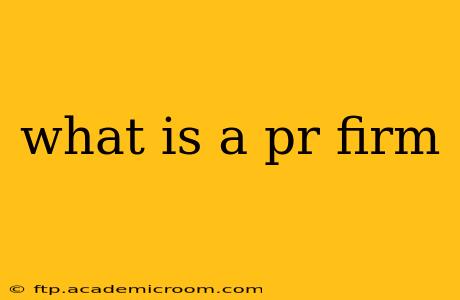Public relations (PR) is crucial for building and maintaining a positive reputation. But managing your image effectively requires expertise, strategy, and consistent effort – which is where PR firms come in. This comprehensive guide will explore what a PR firm is, what they do, and how they can benefit your organization.
A PR firm, also known as a public relations agency, is a specialized company that helps individuals, businesses, and organizations manage their public image and communications. They employ a team of professionals who strategize and execute campaigns to build and protect their clients' reputations. Think of them as image architects, crafting narratives and managing the flow of information to achieve specific goals.
What Does a PR Firm Do? A Deep Dive into Their Services
PR firms offer a wide range of services, tailored to meet the unique needs of each client. These typically include:
-
Media Relations: This is a core function, involving building relationships with journalists and media outlets to secure positive coverage in newspapers, magazines, television, and online publications. This can involve writing press releases, pitching stories, managing media inquiries, and even crisis communication.
-
Crisis Communication: When negative events threaten an organization's reputation, a PR firm can act swiftly to mitigate damage. They develop crisis management plans, provide media training, and manage communications during a crisis to minimize negative impact.
-
Content Creation: PR firms often create a variety of content, including press releases, blog posts, website copy, social media posts, and even speeches, all designed to communicate a client's message effectively and engagingly.
-
Social Media Management: In today's digital landscape, social media is paramount. PR firms manage social media accounts, develop content strategies, engage with audiences, and monitor online conversations to protect a client's online reputation.
-
Reputation Management: This involves actively shaping and protecting a client's reputation, both online and offline. This could involve responding to negative comments, correcting misinformation, and proactively building positive sentiment.
-
Event Planning & Management: PR firms can plan and manage events, such as press conferences, product launches, and industry conferences, to create opportunities for media coverage and brand engagement.
-
Investor Relations: For publicly traded companies, PR firms can help manage communications with investors, analysts, and the financial media.
-
Public Affairs: This involves engaging with government officials, regulatory bodies, and other stakeholders to influence policy and build relationships.
How Can a PR Firm Benefit Your Organization?
The benefits of hiring a PR firm are numerous:
-
Expertise and Experience: PR firms employ professionals with extensive knowledge and experience in media relations, communications strategy, and crisis management. They have the skills and networks to achieve results that might be difficult for an in-house team to accomplish.
-
Objectivity and Fresh Perspective: An external agency can offer an unbiased perspective, identifying opportunities and challenges that an internal team might overlook.
-
Time Savings: Outsourcing PR allows your team to focus on core business functions, freeing up valuable time and resources.
-
Increased Media Coverage: PR firms have established relationships with journalists and media outlets, significantly increasing the chances of securing positive media coverage.
-
Enhanced Reputation: A well-executed PR campaign can significantly improve your organization's reputation, building trust and credibility with your target audience.
-
Cost-Effectiveness: While there's an investment involved, a successful PR campaign can generate a substantial return by attracting new customers, partners, and investors.
What are the different types of PR firms?
There are various types of PR firms specializing in different industries, sizes of clients, and service offerings. Some examples include niche firms focusing on technology, healthcare, or non-profit organizations, while others are full-service agencies offering a broader range of services. The choice depends entirely on your specific needs and budget.
How much does a PR firm cost?
The cost of hiring a PR firm varies widely depending on factors such as the agency's size and reputation, the scope of services required, and the length of the contract. It's essential to discuss fees and payment structures upfront to avoid any surprises.
How do I choose the right PR firm for my business?
Selecting the right PR firm requires careful consideration. Research agencies specializing in your industry, review their portfolios, and request references. Schedule meetings to discuss your needs and assess their understanding of your business and target audience. Choose a firm that aligns with your values, budget, and long-term goals.
By understanding the role and capabilities of a PR firm, you can make an informed decision about whether to invest in their services and elevate your organization's profile to new heights. Effective PR is an investment in your future success.
